Saif
Senior Member
- Joined
- Jan 24, 2024
- Messages
- 16,093
- Likes
- 8,059
- Nation

- Axis Group


NCP leader Hannan pledges unity in nation-building after July Uprising
Senior Joint Chief Convenor of the National Citizen Party, or NCP, Abdul Hannan Masud has pledged to rebuild Bangladesh by uniting all political parties, inspired by the youth-led July uprising. Speaking at the party’s launch on Friday afternoon at Dhaka’s Manik Mia Avenue, he said: &l
NCP leader Hannan pledges unity in nation-building after July Uprising
bdnews24.com
Published :
Mar 01, 2025 00:09
Updated :
Mar 01, 2025 00:09

Senior Joint Chief Convenor of the National Citizen Party, or NCP, Abdul Hannan Masud has pledged to rebuild Bangladesh by uniting all political parties, inspired by the youth-led July uprising.
Speaking at the party’s launch on Friday afternoon at Dhaka’s Manik Mia Avenue, he said: “The Bangladesh of tomorrow will be a democratic Bangladesh.”
The Anti-discrimination Student Movement led a mass protest against the Awami League government, ending its uninterrupted 15-year rule on Aug 5, 2024.
Following allegations of election rigging, human rights violations, corruption, and money laundering, the Awami League government was ousted.
The Anti-discrimination Student Movement then formed a political party, promising a "new political settlement”.
At the launch of NCP, former coordinator of the movement Hannan Masud vowed to build a new Bangladesh.
“The youth will not allow any more loss of lives due to political clashes before elections. In the future, Bangladesh will be a place for all political parties and ideologies to coexist,” said Masud.
He assured the people, “We promise you that the Bangladesh of tomorrow will be a democracy. Under the leadership of the youth, we will establish a country free from extortionists and land grabbers.”
Referring to historical betrayals since the Liberation War, Masud said: “The hundreds of thousands of students and people standing before me are witnesses to the post-uprising history being written today. It is the youth who led the July Uprising that are making this history.”
Hasnat Abdullah, NCP’s chief organiser (south region), emphasised overcoming divisive politics and ushering in “politics of unity”.
Speaking at the same event, he said: “Family rule has been buried in this country. The son of a blacksmith can be the prime minister; the son of a potter can be the prime minister. Leadership in this country will rise based on merit.”
“We want to build a beautiful Bangladesh where there will be no discrimination,” he said.
Hasnat, also a key figure in the Anti-discrimination Student Movement, said: “After 15 years of Awami ‘barbarism’, we have liberated the parliament from ‘fascism’. Today, we stand at Manik Mia Avenue on our way to that very parliament.”
He criticised past political decisions, saying: “From the Logi-Boitha (boat-hook and oar) violence to the 2009 massacre of the BDR, the ‘defence of the first line,’ under Indian aggression, you have witnessed it all.”
“The clear case of the BDR killings was falsely framed as a BDR Mutiny. You also witnessed the ‘genocide’ carried out under the cover of darkness against our bearded, cap-wearing brothers at Shapla Chattar.”
He also said, “You have seen how the system of rigging elections at night before polling day was introduced and how ‘dummy’ elections were held.”
“We buried the ‘tyranny’ of the Awami League on Aug 5. We declare that the decision of who enters the parliament will be made by Bangladesh, not India. The hardworking people of this country will decide,” he asserted.
Hasnat criticised governance over the past 15 years, saying: “We failed to build a united nation and allowed divisive politics to persist deliberately. We failed to ensure good governance, an independent police force, and an impartial judiciary.”
“We pledge to establish independent and effective institutions. We will rise above divisive politics and establish unity. We will develop the state,” he concluded.
bdnews24.com
Published :
Mar 01, 2025 00:09
Updated :
Mar 01, 2025 00:09
Senior Joint Chief Convenor of the National Citizen Party, or NCP, Abdul Hannan Masud has pledged to rebuild Bangladesh by uniting all political parties, inspired by the youth-led July uprising.
Speaking at the party’s launch on Friday afternoon at Dhaka’s Manik Mia Avenue, he said: “The Bangladesh of tomorrow will be a democratic Bangladesh.”
The Anti-discrimination Student Movement led a mass protest against the Awami League government, ending its uninterrupted 15-year rule on Aug 5, 2024.
Following allegations of election rigging, human rights violations, corruption, and money laundering, the Awami League government was ousted.
The Anti-discrimination Student Movement then formed a political party, promising a "new political settlement”.
At the launch of NCP, former coordinator of the movement Hannan Masud vowed to build a new Bangladesh.
“The youth will not allow any more loss of lives due to political clashes before elections. In the future, Bangladesh will be a place for all political parties and ideologies to coexist,” said Masud.
He assured the people, “We promise you that the Bangladesh of tomorrow will be a democracy. Under the leadership of the youth, we will establish a country free from extortionists and land grabbers.”
Referring to historical betrayals since the Liberation War, Masud said: “The hundreds of thousands of students and people standing before me are witnesses to the post-uprising history being written today. It is the youth who led the July Uprising that are making this history.”
Hasnat Abdullah, NCP’s chief organiser (south region), emphasised overcoming divisive politics and ushering in “politics of unity”.
Speaking at the same event, he said: “Family rule has been buried in this country. The son of a blacksmith can be the prime minister; the son of a potter can be the prime minister. Leadership in this country will rise based on merit.”
“We want to build a beautiful Bangladesh where there will be no discrimination,” he said.
Hasnat, also a key figure in the Anti-discrimination Student Movement, said: “After 15 years of Awami ‘barbarism’, we have liberated the parliament from ‘fascism’. Today, we stand at Manik Mia Avenue on our way to that very parliament.”
He criticised past political decisions, saying: “From the Logi-Boitha (boat-hook and oar) violence to the 2009 massacre of the BDR, the ‘defence of the first line,’ under Indian aggression, you have witnessed it all.”
“The clear case of the BDR killings was falsely framed as a BDR Mutiny. You also witnessed the ‘genocide’ carried out under the cover of darkness against our bearded, cap-wearing brothers at Shapla Chattar.”
He also said, “You have seen how the system of rigging elections at night before polling day was introduced and how ‘dummy’ elections were held.”
“We buried the ‘tyranny’ of the Awami League on Aug 5. We declare that the decision of who enters the parliament will be made by Bangladesh, not India. The hardworking people of this country will decide,” he asserted.
Hasnat criticised governance over the past 15 years, saying: “We failed to build a united nation and allowed divisive politics to persist deliberately. We failed to ensure good governance, an independent police force, and an impartial judiciary.”
“We pledge to establish independent and effective institutions. We will rise above divisive politics and establish unity. We will develop the state,” he concluded.











































